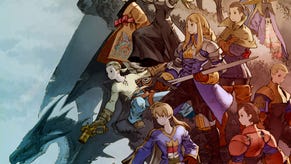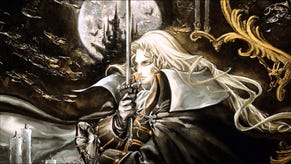Comfort Food Games: Final Fantasy Tactics
USgamer's Tactics RPG fan holds a Square Enix cult classic close to his heart. A look at Final Fantasy Tactics.
This article first appeared on USgamer, a partner publication of VG247. Some content, such as this article, has been migrated to VG247 for posterity after USgamer's closure - but it has not been edited or further vetted by the VG247 team.
Way back in 1998, I got my hands on a disc for Final Fantasy Tactics. I was young, I had tons of free time, and it said "Final Fantasy" on the cover. Worst case scenario, I returned the the game, best case I got a couple of hours enjoyment out of it.
That's the beginning of my long-held affection for Final Fantasy Tactics.
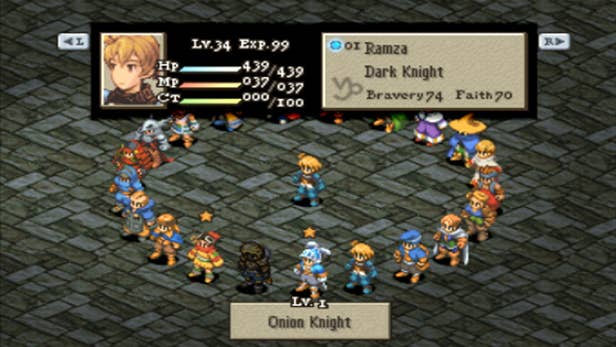
If you're unaware of the plot of Final Fantasy Tactics, here's a quick recap. Young Ramza Beoulve is of noble birth in the world of Ivalice. He and his best friend, the commoner Delita Heiral, get wrapped up in the ongoing War of the Lions currently tearing the world apart. Two sides are vying for the crown: Prince Goltana of the Black Lion and Prince Larg of the White Lion. In-between the overall conflict Ramza and Delita have to deal with each other, soldiers and mercenaries, questions of class and morality, betrayal, and even a bit of religion. It's that stuff that people are eating up in Game of Thrones on HBO now.
Prior to Tactics, I had never played a game like this at all. I'd never touched strategy games and certainly not Tactics games; Tactics Ogre hit American shores around the same time and while I had seen a friend play Shining Force, I'd never picked up the controller myself. I was learning about the entire tactical RPG genre as I was playing.
Even the games that I had played with a more narrative bent weren't in the same area as Tactics. Most tended to boil down to the same basic plot: a hero and his ragtag band of misfits have to save the world from something terrible, possibly supernatural in origin. Final Fantasy Tactics ended up there eventually, but not before dealing heavily with the back-stabbing of the noble class, the plight of the poor, a religious conspiracy, and the sundering of Ramza and Delita's friendship. There were other titles that played in similar ponds – sorry, I've never played any of the Romance of the Three Kingdoms games – but Tactics was the first for me. It was the game that introduced me to a larger world of gameplay and narrative.
I was there every step of the way with Ramza, who's an established character in the world, but remains mostly a blank slate, allowing you to project yourself onto him. (I think the gender-neutral original design by the amazing Akihiko Yoshida really helped in this case.) Delita's acceptance of how the nobility worked and his decision to join that mire made me question how class works in our world. Draclau's (Delacroix in the PSP remake) revelation of his true form genuinely surprised me and kicked off the game's more Final Fantasy-esque plot. The sad end of Ramza's brothers Dycedarg and Zalbag, and the latter's final wish highlighted how even family can be led astray. And for someone who was used to the "the good guys completely win" endings of many games, Tactics' ending was a complete punch in the gut.
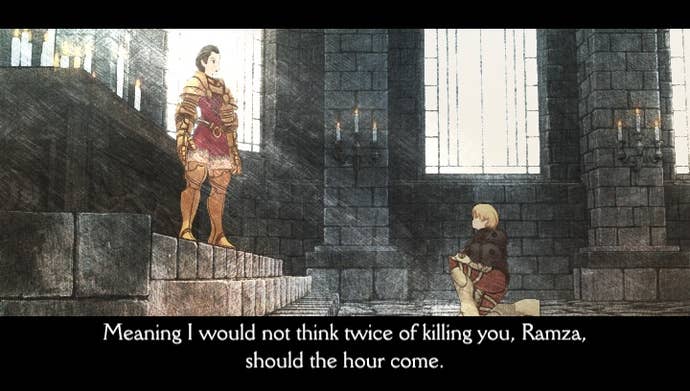
The game expanded on the Class System found in Tactics Ogre, offering up a total of 20 jobs for players to master. Many of the Jobs were based on Final Fantasy mainstays, like the Black Mage, the Summoner, or the Lancer. Each character could take up whichever jobs you had unlocked and part of the game's challenge came from mixing and matching Jobs and job abilities to create the best party. I had a certain affinity for melee Jobs over magic ones; Monk and Ninja were my mainstays, though I did have at least one Mage or Calculator on my team at all times.
And did I mention that Final Fantasy Tactics was hard? It wasn't the most balanced of games, so there were random spikes of difficulty in certain battles. You'd be cruising along with your chosen team (Monk is your first and last stop) only to run headfirst into a battle where that team was a bad, bad choice. Fighting Wiegraf alone towards the end of Chapter III is absolutely brutal; ask any FFT fan and they'll shake their head in sadness. There's a rare battle at a location called Barius Hill that will wreck most players. Sometimes, you'll enter a random battle where the deck is stacked against you: enemies with Petrify when you lack the items or ability to cure it, any escort mission, putting up a team of Mages up against Archers with the high ground. FFT does not play around and even with maxed out characters, you can find yourself in some bad situations.
Admittedly, Final Fantasy Tactics' didn't go as far as director Yasumi Matsuno's previous work in Tactics Ogre, which shared many of the same traits. Tactics Ogre allowed players to make choices that affected their experience of the game's overall plot. It contained an alignment system grounded somewhat in reality, based on political alliances and your actions in wartime. Matsuno later said that Tactics Ogre's plot was based on the conflict in Yugoslavia in the early 90s, something that came through in the complex narrative. (If you want to know more about Tactics Ogre, Jeremy wrote a great retrospective on it back in his 1UP days.)
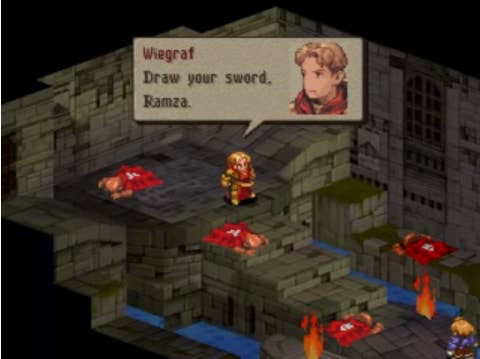
Tactics Ogre was the more mature and thoughtful older sibling; Final Fantasy Tactics shared many of the same traits, but presented them in a more fun and approachable way. If someone wanted to get into the tactical RPG genre, Final Fantasy Tactics is the game I'd give them. From there you can get to Tactics Ogre, Fire Emblem, Front Mission, Sakura Wars, Shining Force, and any other staples of the genre. I've played a lot of Tactics games in my time, but Final Fantasy Tactics remains the gold standard: enough complexity to be interesting without getting bogged down in minutiae. Some Tactics titles err too much on either side, which can ruining the game.
Since that fateful afternoon, I've purchased Final Fantasy Tactics and its remake, Final Fantasy Tactics: War of the Lions, more than a few times. Three times on PlayStation due to loss or wear, once on PlayStation Portable in disc form, and once on PlayStation Network to play on Vita. I'll probably pick it up again on Android whenever Square Enix gets around to releasing that version in the United States. It's just such an amazing game that not even its sequels, Final Fantasy Tactics Advance and Final Fantasy Tactics A2, can touch it. I'm still waiting for the perfect sequel or spiritual successor, but sometimes I wonder if it's a fool's quest.
Ah, well. It doesn't matter because Final Fantasy Tactics is still here at my fingertips. Time to start up another game, I guess.


